By C. Adhikesavan
Global inequality is worsening significantly, creating widespread societal and economic challenges. Inequality refers to the unequal or unjust distribution of resources and opportunities within a society. It weakens social bonds, fosters political polarization and hinders social mobility. While inequality and economic growth are not directly correlated, excessive inequality can disrupt economic progress and lead to social conflict. In some cases, it fuels resentment among those with fewer resources, as demands for equality are often misinterpreted as envy by capitalists.
For instance, South Korea demonstrates growing inequality in income and wealth. Since the 1997 Asian financial crisis, income inequality and relative poverty have remained high. According to the Gini coefficient, a measure of income inequality, South Korea scored 0.333, indicating a growing disparity. The income share ratio reveals that the wealthiest 20 percent earn nearly six times more than the poorest 20 percent. Relative poverty, defined as the proportion of individuals earning less than 50 percent of the median income, stands at 15 percent – a figure notably higher than in many Western countries.
Additionally, South Korea is experiencing significant demographic shifts. The proportion of the population over 65 is 17.5 percent, expected to rise to 46 percent by 2070. This aging population, combined with the world’s lowest fertility rate, places immense pressure on public spending for welfare. These economic and demographic changes are further compounded by geopolitical risks, creating an environment where inequality becomes an even greater concern.
Inequality across the globe
Disparities in income, wealth, health, education and housing are widening globally, impacting both rich and poor countries. In South Korea, wealth imbalance has intensified over the past decade, especially among younger generations who lack assets and feel a sense of hopelessness. The inheritance of wealth, particularly as baby boomers retire, is likely to exacerbate inequality. When inherited wealth, rather than effort and ability, dictates an individual’s life opportunities, social stability may be at risk.
Historical data reveals that inequality is at its highest levels in many countries, including China, India, Japan, the United States and South Korea. In contrast, some nations like Brazil, Nigeria and Indonesia have experienced stable or decreasing inequality, despite historically high levels. These exceptions provide a basis for understanding the potential for policy interventions to reverse inequality trends.
The 1980s marked a pivotal moment for rising inequality globally. Policies promoting low taxation for the wealthy and justifying inequality as necessary for economic growth became prevalent. For example, under President Reagan in the US and Prime Minister Thatcher in Britain, marginal tax rates for the rich were drastically reduced. Simultaneously, corporate executives began justifying skyrocketing salaries, resulting in enormous pay gaps between CEOs and average workers. However, evidence shows no significant correlation between inequality and economic growth. In fact, more unequal countries often grow slower, and the supposed necessity of inequality for economic progress is largely unfounded.
Role of wealth concentration
The extreme concentration of wealth now plays a significant role in perpetuating inequality. A tiny fraction of the population – often the wealthiest 0.001 percent – has seen income growth far outpacing even the top 1 percent. These individuals often derive their income from wealth rather than labour or skills. Consequently, global brands and monopolistic companies dominate the market, further consolidating wealth and stalling economic competition.
This concentration has political consequences. For example, rising inequality has fueled support for populist leaders like Donald Trump, who gained votes from regions with stagnating wages. While such leaders often promise economic relief, they rarely implement redistributive policies.
Impact of AI and education
The rise of artificial intelligence (AI) poses new challenges to inequality. Unlike previous technological shifts, AI is expected to disproportionately affect middle-skilled workers, such as accountants, rather than low-skilled workers. This shift threatens the economic security of the “middle class,” particularly in countries like the US where these jobs are well paid.
Additionally, access to elite education is becoming prohibitively expensive, driven by fears of job displacement by AI. Wealthier families have a significant advantage in securing admission to prestigious institutions, further perpetuating inequality. This educational disparity limits social mobility and deepens economic divides.
Policy solutions
Addressing inequality requires a multi-faceted approach. Tax reforms are critical, particularly in areas like wealth and estate taxes. A global agreement to eliminate tax havens is essential to ensure equitable wealth distribution. Additionally, governments should reconsider subsidies for AI-driven automation, as these subsidies often fail to account for the societal costs of displaced workers.
Investment in retraining and education for workers affected by AI and global trade is crucial. Programs like the US Trade Adjustment Assistance must be expanded and effectively implemented. Anticipating job losses and helping workers transition to new sectors will minimize economic shocks.
Redistribution policies must also be designed to reduce stigma. Unemployment and poverty should not be viewed as personal failures, especially when they result from systemic changes like automation. Providing universal basic income or similar support mechanisms could alleviate the financial and psychological burdens faced by displaced workers.
Inequality is a growing global challenge that threatens economic stability, social cohesion and political systems. From South Korea’s demographic pressures to the global impacts of AI and wealth concentration, the drivers of inequality are multifaceted and interrelated. However, history and data demonstrate that inequality is not inevitable. By implementing targeted policies, such as tax reforms, education investments and social safety nets, societies can reduce disparities and promote a more equitable future.
New Age Weekly (India)
Support working-class media!
If you found this article useful, please consider donating to People’s Voice or purchasing a subscription so that you get every issue of Canada’s leading socialist publication delivered to your door or inbox!




